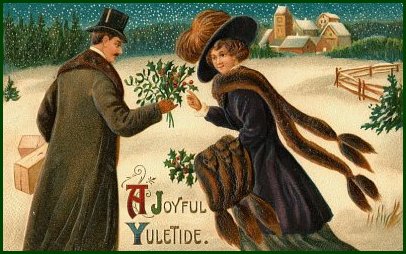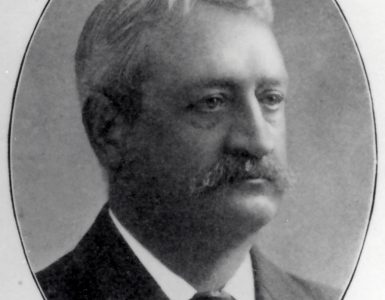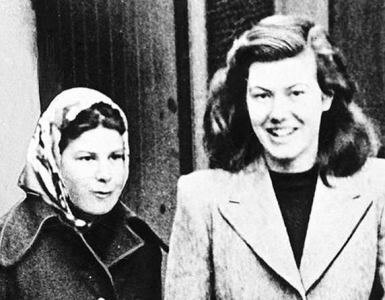by Mary Elizabeth Naugle
First published in December/January, 2004-2005, Volume 1, Issue 6, The Hatchet: Journal of Lizzie Borden Studies.
The Bordens were dead to begin with: there can be no doubt about that. Back in August, half Fall River had traipsed through the formerly double and treble locked doors to witness the novelty of doings at the Borden home, not a home given to amusements. Doctors Bowen and Dolan had duly examined the deceased, and once assured that the two were indeed as dead as the nails Andrew once drove into the coffins he built and sold (at a reasonable rate), they saw to it that both heads and stomachs were removed and delivered to Boston for further study by a specialist. The remains remaining to the couple had been afterwards interred with ceremony and tears from at least a few.
Of all this Marshall Hilliard could be sure. Officers Doherty, Mullaly, and Fleet had been upon the scene almost from the discovery. He, himself, had followed soon enough. And disfigured though the two had been, there could be no doubt that they were the bodies of Andrew and Abby—a couple like the Sprats, one tall and lean with a billy goat beard; the other nearly filling the space between bed and dresser, so his men had their work cut out for them to step round the woman without compounding her indignity by tumbling over the lifeless but copious form.
No, the question was not whether the two had shed their mortal forms, but how? Suicide was out of the question. A man or woman might rain down one blow by a sharp and heavy object, but not so many as this. And then, how might the suicides spirit away the weapon? Perhaps poor Miss Lizzie might have done so for fear of the stigma of suicide, but the alternative stigma of murderess was surely much worse. And the prospect of Christmas in Taunton Jail was even less cheerful than the prospect of Christmas at 92 Second.
Just as surely as the two were dead, they were dead at the hand of some miscreant, some miscreant holding some weapon. But who and what? These were the questions that haunted Marshall Hilliard that chilly Christmas Eve, only months away from the trial of a woman who must have but couldn’t have done the deed. No blood on her maidenly hands or clothing, no plausible weapon anywhere near, no hasty departure to dispose of any such weapon. Hilliard raked through the burgeoning stack of mail from cranks, hoping to stir up some ember from those ashes. Among them were helpful suggestions from phrenologists, mesmerists, graphologists, and clairvoyants.
“Bah,” muttered Hilliard, “Humbugs!”
Here lay a suggestion that he examine the retinas of the murdered pair. Impostor! Those retinas had been boiled away with the rest of the tissues when the examiners stripped down the skulls. Why taunt him with them now? Besides, Hilliard was quite sure their eyes had been tightly closed to their assailant.
Here lay an offer of clairvoyant skill at a flat rate of eight dollars for putting Hilliard on the trail. And beside it lay a communication from a more experienced and ambitious practitioner, demanding two thousand cash for a charm guaranteed to run the killer to ground. What gave these confidence artists the idea that they could pick a man’s pocket every time he was hot on the trail of a killer?
Some were transparent as the shades they claimed to conjure up. Here was a transcript of answers from a table tapping session held by a purveyor of patent medicines and an electro-therapist:
Q. What spirit from the ethereal realm wishes to speak to us?
A. Abby Borden
Q. Have you any message to convey to us?
A. Yes.
Q. What is that message?
A. I should have survived had my blood been strengthened by Lydia Pinkham’s elixir—
(Sudden emphatic raps and rumblings from table elicit a new line of questioning.)
Q. Have we another ectoplasmic visitor?
A. Yes.
Q. And who might you be?
A. I am Andrew Borden.
Q. What is your message, Andrew?
A. That I might have been roused from my infirmity by means of application of electrified wires had I the foresight to install electricity and had the doctor seen fit to buy a portable kit for the low, low price of—etc., etc.
The senders of the previous transcription had thoughtfully wished to remain anonymous. Marshall Hilliard wished only to be left alone.
The light outside the office grew dim, and Marshall Hilliard stayed on alone in his own small pool of gaslight, which suddenly guttered as if by a gust of wind, while the papers surrounding him fluttered in a wind he couldn’t feel. Hilliard turned a practiced eye to door, windows, and stove. Door closed. Shutters fastened. Stove likewise done up tight and snug. Yet the flame and letters danced to a tune he could not hear.
“What’s all this?” growled Hilliard.
A bargelike shoe nosed into the pool of light. A congress shoe, soon followed by a trouser leg of outdated fashion, a cardigan, all solid enough until the shoulders emerged without their head. That head Hilliard soon discovered was tucked under the man’s arm, and though arm and hand had flesh enough about them, the head gleamed white and glared up at the marshall from eyeless sockets.
“Can you speak?” choked out Hilliard with hollow bravado.
“I can,” came the hollow reply from the jaws that spoke well enough, in spite of being under the man’s arm like a parcel.
“Then state your name and business.”
“In life I was Andrew Borden, and murder is my business.”
“Yours and everyone else’s it would seem.”
“OOOOOOOOOOOOOO,” the spectre set up a moan that could have guided in the quahog boats, “You don’t believe in them or me.”
“Oh, you’re no fraud like those others. You’re a figment of my own imagination—a bit of undigested mutton, a crumb of johnny cake, a spoiled banana—”
“You’re mocking my last meal. You don’t even eat mutton.”
“Well something else then—a slice of corned beef maybe—that put me in a doze and brought on this dog and pony show.”
“Not dogs or ponies, this!” and the phantom rattled a parcel filled with jingling pieces of metal. The spirit painstakingly poured out the contents of the parcel, which turned out to hold not coin but tarnished and dusty bits of ironmongery.
“Do you see these?” demanded the visitor.
“I do.”
“You’re not looking at them.”
“I don’t have to look to know they’re worthless pieces of junk.”
“Precisely! These are the remains of a wasted life. Pieces of a broken lock I brought home—for what? Did they protect me? Enrich me? Enlighten me? No! They were one more piece in a long long ball of saved string. Look here.”
The ghostly visitor extracted a lint-laden ball of string that had bulged from his cardigan pocket and thrust it in the marshall’s face.
“I see, but I don’t see the point. And why? Because there is none! Your lock, your string, they have no more substance to them than you do.”
“But look! I! Andrew Borden, a man who knew the value of a dollar, and this is what I’m buried with: a broken lock and a ball of string. And why? Because I saved what I did not need, and I scrimped when I should have spent. Those clairvoyants offer you assistance for what? Eight dollars? Two thousand at the most? Money that could set up clairvoyant parlors across the nation, parlors that could assist lawmakers like you in tracking down the criminals that plague us. That money would provide evidence that could save the city, nay the country, thousands every year in tracking down false leads. And it would put to work the wistful shades of men like me, giving shape and purpose to our afterlives. Otherwise, we stand by silent and helpless to intervene for the common good.”
“See that prosperous-looking lady keening in the corner? That is the late Mrs. Borden bemoaning the fact that Mrs. Churchill never stays in one room long enough at a time for the dear lady to catch up and impart her receipt for pear compote. Poor Mrs. Borden is still short of wind, you know. That’s why she appears less often than I; the medium seldom has the patience to wait for her. But she is eager as the rest of us to speak out loud and bold.”
“If you’re so keen to clear up this case, then why don’t you do so now?”
“You wrong me, sir. You know full well that I was sleeping at the time. But there were others who were not! I come on behalf of those vigilant denizens of the other world and those on earth who wish to bridge the gap between us. Before it is too late, take heed of this Christmas visit. Read these missives, and reach out to those who sent them. Learn from me. Be not too cheap, too close, too cold lest this case never be solved.”
Borden now raised the head to his neck, where it rested improbably, then tied it in place with its muffler, straining for dignity even when the skull wobbled alarmingly to one side. This done, he leaned forward to gather together the scattered letters into a neat stack like a plate of flannel cakes. He then turned on his heel and oozed out the door, leaving ectoplasmic prints along the way. Mrs. Borden, rocking her head in her lap like a puling babe, likewise dissolved though more slowly, and Hilliard was left to himself.
The pealing of the midnight bells ringing in Christmas Day soon broke the silence. Hilliard awoke with a crick in his neck and the uncomfortable knowledge that Mrs. Hilliard would have his hide for staying at the office so late tonight of all nights. Hilliard timidly peeked round the desk to see whether the prints remained, but all was as it had been, as it should be. The stove was cold, but no wind whipped down the stovepipe or whistled through the shutters, and the papers on his desk lay as stirred up as before. Hilliard scooped up the lot and tossed them in the stove as tinder for the next fire. He set out for home, slamming the door with a loud “Humbug!”
The rest is history.






